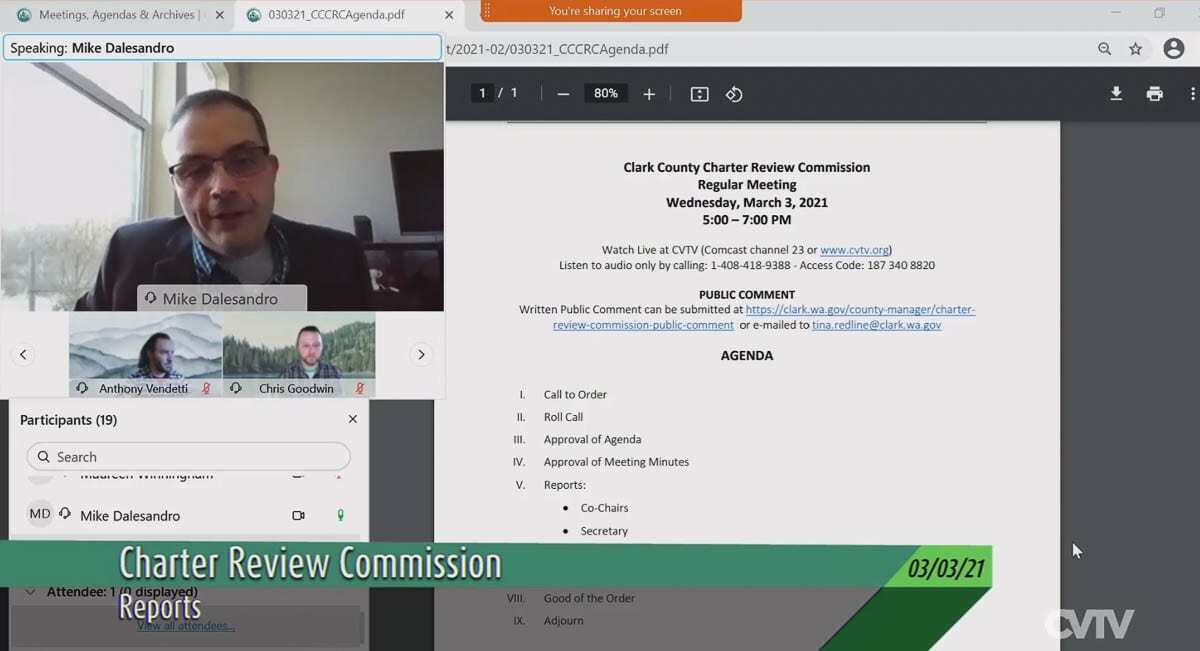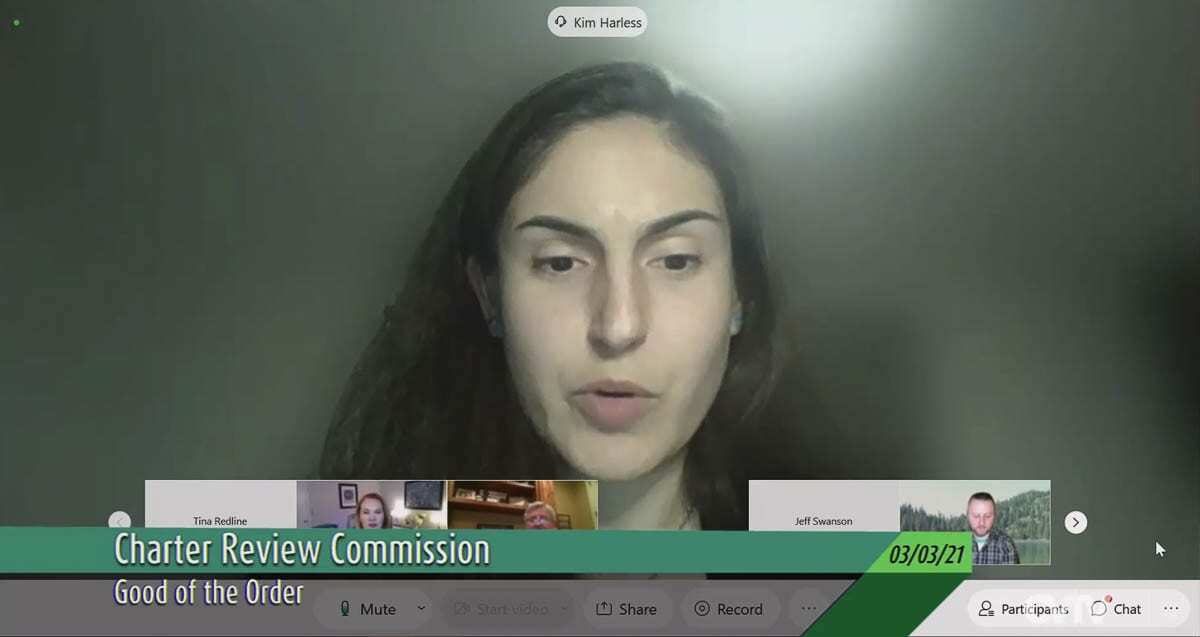Non-partisan county offices, rank choice voting and redistricting among top concerns
CLARK COUNTY — The Clark County Charter Review Commission met in the evening on March 3 for a special workshop on laying out top issues they’d like to address.
With the help of Jeff Swanson from Exigy Consulting, the commissioners each weighed in on the concerns and actions that were most important to them and their constituents. The overall goal of the commission is to review and amend the Home Rule Charter, which operates much like a constitution for Clark County.

“I want you to think of those things from an intuitive perspective,” Swanson said. “So if I were to shake you awake, in the middle of the night from a dead sleep, and ask you why you favor a particular policy, you should be able to sort of barf out in 30 seconds or less the intuition behind the issue, and why is the priority.”
In a series of five rounds that lasted two hours, commissioners shared their top three issues, elaborated on them, and then amended and added to their initial list. At the end of the evening, all this information was collected by Swanson and will be used to create meeting agendas and take action on changes listed therein.
Among some of the most repeated topics were reducing or eliminating partisan positions in county government, instituting ranked-choice voting, redistricting or adding districts, and several issues connected to equity, ethics and inclusion.
First to comment was Commissioner Jeff Angelo who serves as one of three in Councilor District 3; the seat recently won by Karen Bowerman.
“Personally, I don’t think we should have partisanship in our elected officials’ offices,” Angelo said of county government. “Also, because of our growth, I mean, we’re growing at a minimum rate of 1.25 percent. We need more districts. I’m hoping we will add two districts. And then an Office of Equity and Diversity, and inclusivity, and whatever other ‘ivity’, we’d like to put at the end there. In our world right now, it is a necessary component to have.”
On issues like this, the commission has the ability to amend the contents of the home Rule Charter, but policy in action and direct policy work is done by the County Council. The commissioner’s job is to advise and modify the responsibilities and authority of the council and the county manager; the legislative and executive branches of the county, respectively.
Following Angelo, Commissioner Mike Dalesandro, who represents the community at large, spoke to his key issues; in many ways echoing Angelo.
“Similar topics here, looking at non partisan positions for the county elected officials that are not councilors. So council partisan, all the other elected officials nonpartisan,” Dalesandro said. “Adding to council districts, and then the last topic for me would be addressing the County Board of Health. Specifically, the Board of Health composition.”
Currently the Clark County Board of Public Health is predominantly area politicians, joined by a minority of doctors or other healthcare professionals. Washington law requires this ratio at present, but a bill before the state legislature may soon allow, or even require, counties to have a larger health professional presence on their boards.
Up next was Commissioner Dorothy Gasque, of Councilor District 2; the seat held by Julie Olson.
“I also want to address the issue of nonpartisan versus partisan. I actually would like to see all of our county elected officials be nonpartisan,” Gasque said. “And the other issue that really ran on was ethics policy, making sure we have an ethics Review Commission, and making sure we have found ethics policy in our charter. And the third one is probably rank choice voting.”
Ranked-choice voting is a significant departure from the long-running method of voting for one candidate. Instead, voters, as the name implies, rank candidates on a scale and then the votes are tallied. If no one candidate receives 50 percent of the votes, the candidate with the least votes is eliminated and the voters that picked them as their number one, have their second choice votes counted. The process continues until one candidate garners 50 percent.
Following Gasque, Commissioner Chris Goodwin of Councilor District 1 shared his thoughts. District 1 is currently held by Councilor Temple Lentz.
“One key priority is looking at a stronger approach to inclusion in our government structure, and how we include that approach in general in the charter,” Goodwin said “It could include creating a commission of its own of some sorts that to help address and provide the voice of communities that need better representation. I believe there are options that we can add to increase and better enhance the voice of all of our voters through a ranked-choice voting option.”
Commissioner Chuck Green spoke next. He represents the people in Councilor District 2.
“I shared some of my thoughts back in January that expanded on a few of these one is the Office of Diversity, Equity and Inclusion,” Green said. “Second one is to go out to the Ethics Review Commission and look at the Pierce County model or the code of ethics. Third would be under the county manager, would be a provision that the county council consult with the sheriff, prosecuting attorney and other administrative elected offices prior to their making the appointment.”
Green also said he would like the rule that in order to assume a new elected office position with the county, you must depart any other elected office.
Next was Commissioner Kim D. Harless who serves in Councilor District 1.
“My top three are diversity, equity inclusion throughout the charter,” Harless said. “Second, one non-partisanship of all the elected offices. And then lastly, the relationship between staff and the elected. You know, that includes sort of county manager, the council, and really a review of that relationship throughout the charter and how it exists.”

Proceeding Harless was Commissioner Eric Holt, who represents the county at large. Holt said after reaching out to constituents, he assembled his top three issues for the coming months.
“I think the top feedback that I got back was in non-partisan, they want to see as many of the positions as possible, nonpartisan,” Holt said. “Another one was an ethics commission that came back pretty strongly. I got a lot of feedback on council districts increasing to five or seven. Then it was pretty balanced … on whether or not the council appoints their own chair or whether it remains an at large position elected by the people.”
After Holt came Commissioner Doug Lasher, who also represents the county at-large.
“My top three are non-partisan, for all elected officials. The second is, once you do that, you need to set up a process for filling vacancies,” Lasher said. “Whether we have five districts or seven districts, I’m wide open on that, but I want to go back to where we had it for the last 150 years where we would have five districts, so that people have to run in the districts in the primary, like most counties do, and run county wide. That way, everybody has a county wide perspective, and everybody gets a chance to vote on the council.”
Lasher also spoke at length about the historical perspective and how he wants to see the process by which the council enacts policy adjusted for governance in 2021.
Following Lasher was Commissioner John Latta of Councilor District 4; the seat held by Gary Medvigy.
“One major thing that I ran on was that I wanted to see equal representation of our council among the districts,” Latta said. “Keep a five member council but have five districts elect one council member from each district. There’s non-partisan council members, I know that’s a question that everybody has. I’m just looking forward to talking about that more because I would like to have a good feeling for why people want to see that.”
After Latta, Commissioner Niles shared her thoughts. Niles represents Councilor District 3.
“I’m a 25 year critical care nurse … so changing the composition of the Board of Health is very important,” Niles said. “I think we can all agree that our communities would be better served by taking politics out of public health, and having input from those that are serving our communities like doctors, nurses, first responders, public health officials, and having input from underserved community groups.”
Niles went on to express her high level of support and confidence in ranked-choice voting and non-partisan county positions. She said she believes the ranked-choice method could help curb uncivil partisanship.
Commissioner Kelsey Potter followed Niles. She currently represents the people of Councilor District 2.
“I am interested in removing non-partisanship from the assessor, auditor, clerk, treasurer positions for sure. I want to have more discussion and dialogue about the county council,” Potter said. “My other would be somehow restructuring the county chair. I don’t think it’s quite fair that districts three and four can essentially run risk free … I think that is just perpetuating councilors moving from those districts into the chair position. I think that should be equitable for all other districts.”
Potter also expressed support for a diversity, equity and inclusion process and body to be added to the charter.
Proceeding Potter was Commissioner Deanna Rusch of Councilor District 4.
“[An] issue that I would like to look at is kind of a broad theme of broad and inclusive representation,” Rusch said. “That can mean a whole host of things whether we’re talking about adding districts, potentially redistricting, potentially restructuring the care versus council structure. I think that kind of ties into what other folks have said about a potential equity discussion and Equity and Inclusion Office.”
Rusch also made mention to her support of reevaluating how staff and council communicate, and the relationships therein.
Following Rusch, Commissioner Anthony Vendetti of Councilor District 1 spoke to his high points.
“I agree with the need for an ethics committee to ensure that we are the best government that we can be,” Vendetti said. “That means the ability to review how our government is operating. I think that’s necessary, especially with the voices of the community out there. What I heard was increased representation. This may hit on various parts of the charter; Office of Diversity, Equity and Inclusion, or ranked-choice voting. However, we can increase our representation within the government.”
The final voice of the evening was Commissioner Maureen Winningham of Councilor District 3.
“I am non-partisan council seats, expanding district seats to seven, an independent ethics board with policies that are enforceable, and consequences,” Winningham said. “And absolutely a board of health with medical professionals on it and not politicians.”
Commissioner Liz Pike of the fourth Councilor District did not attend the workshop.




